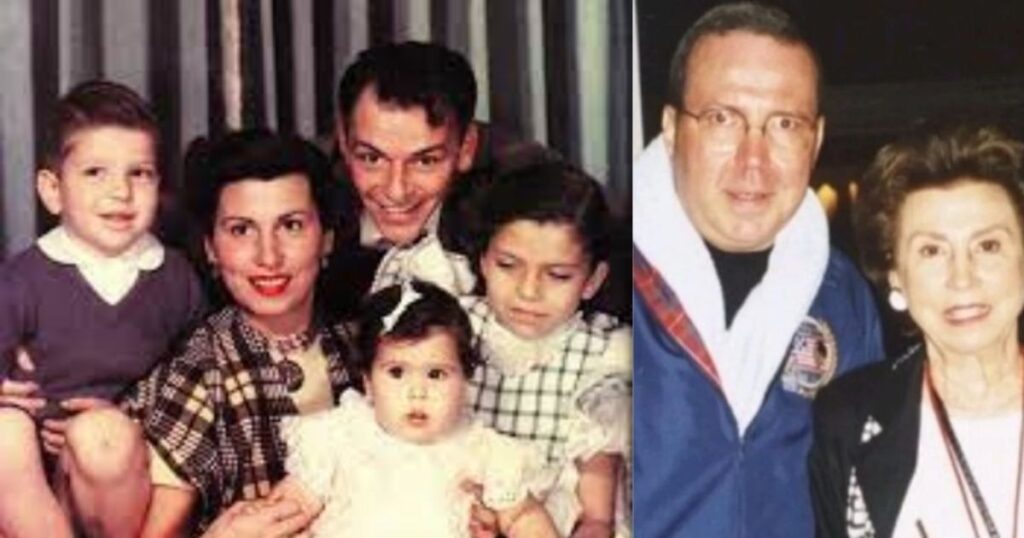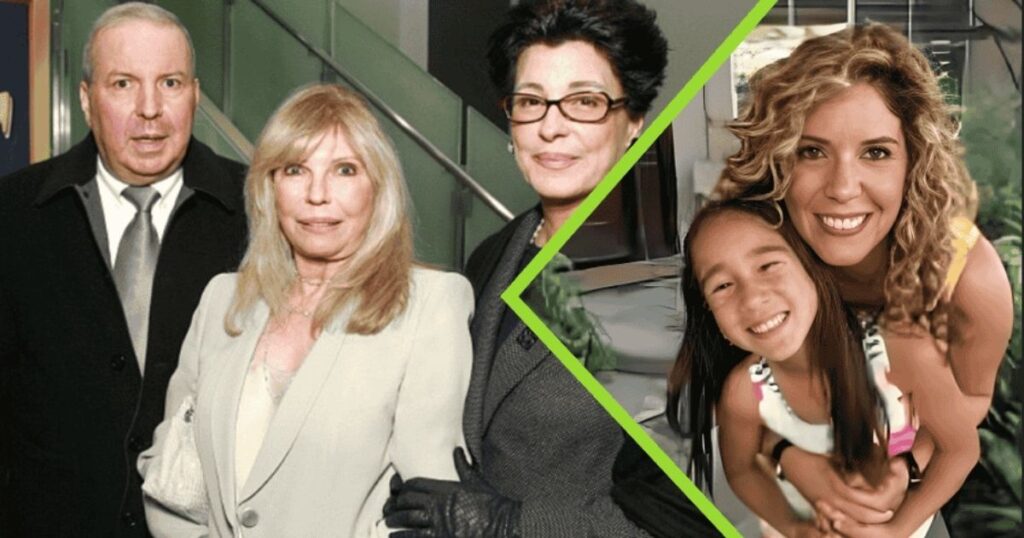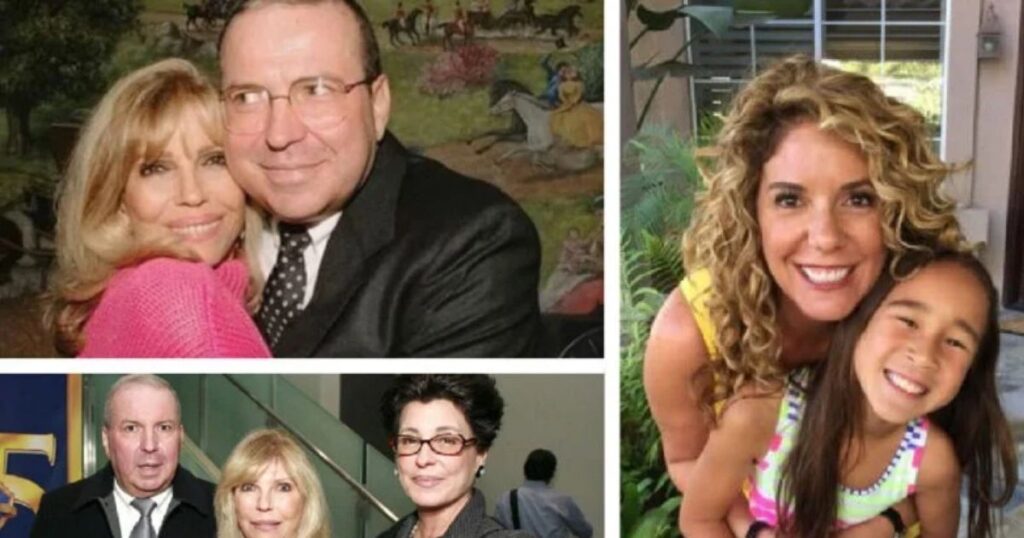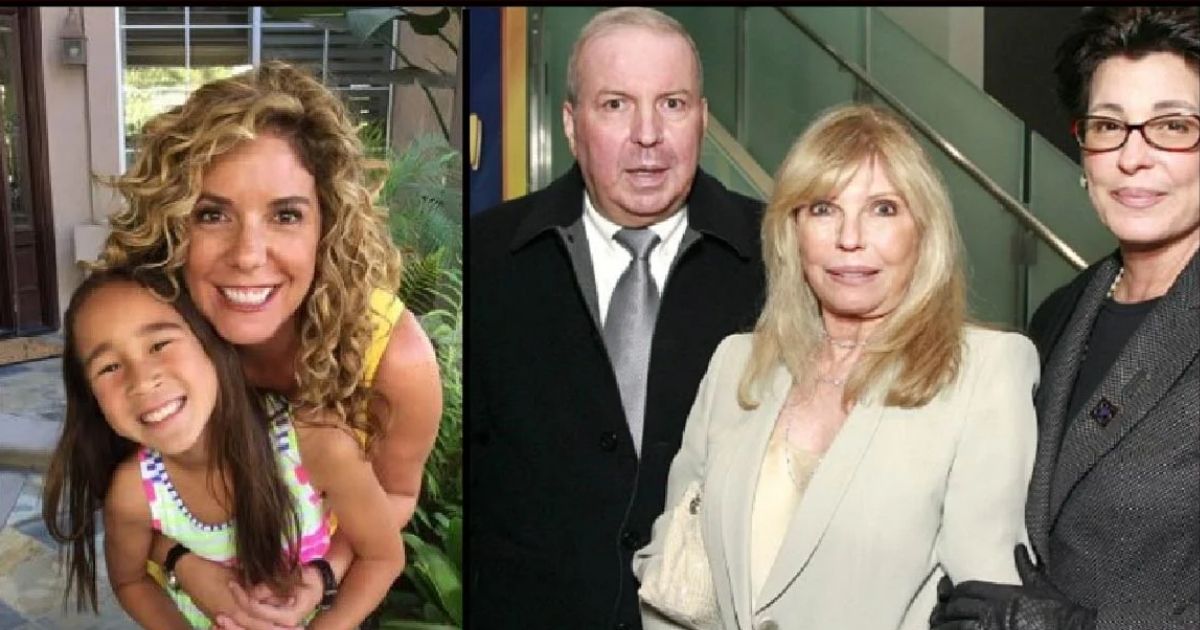The Sinatra legacy represents more than just musical brilliance—it’s a complex tapestry of talent, public scrutiny, and familial expectations.
At the heart of this intricate narrative stands Natalie Oglesby Skalla, a woman who has masterfully crafted her own path, demonstrating that true greatness transcends inherited fame.
Roots of a Remarkable Journey: Early Life and Family Background

Born into the Sinatra family, Natalie Oglesby Skalla experienced a childhood uniquely positioned between extraordinary public visibility and a desire for normalcy.
Her father, Frank Sinatra Jr., carried the immense weight of being the son of Frank Sinatra, while her mother, Mary Sue Oglesby, a residential manager, provided a stabilizing counterforce to the family’s high-profile existence.
Generational Complexity: Understanding the Sinatra Family Dynamics
The Sinatra family narrative is far from simple. Frank Sinatra, a cultural icon who revolutionized American music standards and jazz, created a legacy that simultaneously inspired and challenged subsequent generations.
Frank Sinatra Jr. navigated this complex inheritance, experiencing both the privileges and pressures of being the son of a legendary performer.
| Generation | Family Member | Defining Characteristics |
| First Generation | Frank Sinatra | Legendary Singer, Cultural Icon |
| Second Generation | Frank Sinatra Jr. | Musician, Conductor, Navigating Family Legacy |
| Third Generation | Natalie Oglesby Skalla | Therapeutic Riding Instructor, Redefining Family Success |
Professional Calling: Therapeutic Riding as a Path of Purpose

Natalie Oglesby Skalla’s professional journey represents a profound departure from traditional entertainment legacy expectations.
As a therapeutic riding instructor, she discovered a calling that extends far beyond performance and public recognition.
The Transformative Power of Equine-Assisted Therapy
Therapeutic riding is more than a profession for Natalie Oglesby Skalla—it’s a mission of physical and emotional healing.
By utilizing specialized horseback riding techniques, she helps individuals with disabilities discover unprecedented levels of personal empowerment and physical resilience.
Her approach integrates advanced understanding of equine behavior, human psychology, and specialized physical therapy techniques.
Each session becomes a carefully choreographed experience designed to unlock potential, build confidence, and create meaningful connections between humans and horses.
Navigating Family Dynamics and Personal Identity

Growing up as Frank Sinatra Jr.’s daughter presented unique challenges. The weight of public scrutiny and generational expectations could have easily overwhelmed a less resilient individual.
However, Natalie Oglesby Skalla transformed these potential constraints into opportunities for personal growth and self-definition.
Sibling Stories: Diverse Paths Within the Sinatra Legacy
The Sinatra family narrative is not monolithic but a rich tapestry of individual journeys:
Michael Francis Sinatra embraced the music industry, performing traditional American standards in Las Vegas and maintaining the family’s musical connection.
Francine Sinatra Anderson and Francis Wayne Sinatra opted for more private existences, demonstrating the family’s diverse approach to handling fame.
Personal Life: Crafting Privacy and Meaningful Connection
Married to Brian Skalla, Natalie Oglesby Skalla has deliberately constructed a life prioritizing genuine human connection over public recognition.
Their partnership represents a conscious choice to define success through personal fulfillment rather than external validation.
A Partnership of Shared Values
Brian Skalla and Natalie Oglesby Skalla share a profound commitment to personal growth and community service. Their relationship transcends traditional celebrity narratives, focusing instead on mutual support, shared values, and a commitment to making meaningful contributions.
Community Involvement: Beyond Professional Boundaries
Natalie Oglesby Skalla’s engagement extends far beyond her professional role as a therapeutic riding instructor. She actively participates in community events, continuously expanding her skills and understanding of equine therapy’s transformative potential.
Holistic Approach to Healing and Empowerment
Her work represents more than technical skill—it embodies a holistic philosophy of inclusivity, healing, and human potential. Each interaction becomes an opportunity to challenge limitations, rebuild confidence, and create pathways for personal transformation.
Overcoming Adversity: A Testament to Resilience
The journey of Natalie Oglesby Skalla illuminates the power of intentional living. Despite being part of a celebrity lineage often characterized by intense public scrutiny, she has crafted an identity rooted in service, compassion, and authentic self-expression.
Transforming Challenges into Opportunities
Where many might have been overwhelmed by familial expectations, Natalie Oglesby Skalla viewed her unique background as a platform for meaningful contribution. Her story demonstrates that true legacy is not inherited but consciously created.
The Broader Context: Understanding Sinatra Family Cultural Impact
The Sinatra legacy extends far beyond musical performance, representing a pivotal chapter in American cultural history. Frank Sinatra wasn’t merely a singer but a cultural phenomenon who redefined entertainment, social dynamics, and artistic expression during mid-20th century America.
Cultural Significance of the Sinatra Narrative
Frank Sinatra’s influence transcended music, touching political landscapes, social movements, and cultural narratives. His journey from humble beginnings to international stardom represented the quintessential American dream, a narrative that profoundly shaped Natalie Oglesby Skalla’s familial context.
Deeper Exploration of Therapeutic Riding
Natalie Oglesby Skalla’s professional commitment to equine-assisted therapy represents a nuanced approach to holistic healing.
This specialized field combines advanced understanding of animal behavior, human psychology, and physical rehabilitation techniques.
Scientific Foundations of Equine Therapy
Therapeutic riding isn’t merely recreational but a structured intervention with measurable psychological and physiological benefits. Research demonstrates significant improvements in:
- Motor skill development
- Emotional regulation
- Sensory integration
- Cognitive processing
- Social interaction capabilities
Generational Perspectives: From Entertainment Legacy to Service-Oriented Professions
The evolution from Frank Sinatra’s performance-driven career to Natalie Oglesby Skalla’s service-oriented profession illustrates fascinating societal transformations. Her choice reflects broader generational shifts valuing personal fulfillment over traditional success metrics.
Psychological Implications of Celebrity Lineage
Growing within a high-profile family environment presents unique psychological challenges. Natalie Oglesby Skalla demonstrates remarkable emotional intelligence in navigating these complex familial dynamics, transforming potential pressures into opportunities for personal growth.
Exploring Family Dynamics: Beyond Surface-Level Narratives
The Sinatra family story is far more intricate than public perceptions suggest. Each family member—Michael Francis Sinatra, Francine Sinatra Anderson, Francis Wayne Sinatra—represents a unique interpretation of familial legacy.
Intergenerational Relationships and Personal Autonomy
Natalie Oglesby Skalla’s relationship with her father, Frank Sinatra Jr., exemplifies the delicate balance between familial respect and individual autonomy.
Her journey illustrates how subsequent generations negotiate inherited expectations while establishing personal identities.
Professional Philosophy: Therapeutic Riding as Transformative Practice
Equine-assisted therapy under Natalie Oglesby Skalla’s guidance represents more than a treatment modality—it’s a holistic approach to human potential. Her methodology integrates:
- Specialized horse interaction techniques
- Psychological support mechanisms
- Physical rehabilitation strategies
- Emotional wellness frameworks
Beyond her professional role, Natalie Oglesby Skalla embodies a comprehensive approach to community engagement. Her work extends theoretical knowledge into practical, transformative experiences for individuals facing various challenges.
Ethical Considerations in Therapeutic Practices
Her approach emphasizes:
- Individual dignity
- Personalized intervention strategies
- Holistic understanding of human potential
- Compassionate, patient-centered care
Intersectionality of Fame, Privacy, and Personal Purpose
Natalie Oglesby Skalla’s narrative powerfully illustrates how individuals can transcend predetermined narratives. Her journey represents a masterful negotiation between public perception and personal authenticity.
Redefining Success Beyond Traditional Metrics
Success, as demonstrated by Natalie Oglesby Skalla, isn’t measured by public acclaim but by meaningful contributions, personal integrity, and genuine human connection.
Continuing Legacy: Future Perspectives
Natalie Oglesby Skalla continues to evolve professionally, consistently expanding her understanding of equine therapy’s transformative potential. Her ongoing commitment suggests a future rich with innovation, compassion, and meaningful service.
Research and Development in Therapeutic Riding
Emerging research indicates promising developments in equine-assisted therapy, positioning Natalie Oglesby Skalla at the forefront of innovative therapeutic approaches.
Would you like me to continue expanding the article further, providing even more nuanced insights into her life and professional journey?
Philosophical Dimensions of Therapeutic Riding
Natalie Oglesby Skalla’s approach to equine-assisted therapy transcends traditional therapeutic methodologies. Her work represents a profound philosophical exploration of human-animal connection, embodying principles of holistic healing and interdependence.
Phenomenological Approach to Healing
Therapeutic riding becomes more than a physical intervention—it’s a deeply existential experience. Horses, with their extraordinary sensitivity and intuitive communication, serve as powerful catalysts for personal transformation.
Neuroscientific Perspectives on Equine-Assisted Therapy
Recent neurological research validates the sophisticated approach Natalie Oglesby Skalla employs in her practice. Interactions with horses trigger complex neurological responses, stimulating:
- Emotional regulation mechanisms
- Neural plasticity
- Stress reduction pathways
- Sensory integration processes
Cultural Reimagining of Disability
Natalie Oglesby Skalla’s work challenges traditional narratives surrounding disabilities. Her therapeutic riding practice reframes disability as a spectrum of human experience rather than a limitation.
Empowerment Through Alternative Therapeutic Approaches
By utilizing horses as collaborative healing partners, she creates environments where individuals can:
- Transcend perceived physical limitations
- Develop unprecedented self-confidence
- Experience bodily autonomy
- Reconstruct personal narratives
Technological Integration in Equine Therapy
Modern therapeutic riding practices increasingly incorporate technological innovations. Natalie Oglesby Skalla likely employs advanced assessment tools, biomechanical analysis, and personalized intervention strategies.
Emerging Technological Frameworks
- Motion capture technologies
- Physiological monitoring systems
- Personalized digital tracking
- Advanced biomechanical assessments
Socio-Cultural Implications of Her Professional Journey
Natalie Oglesby Skalla’s trajectory represents a broader societal transformation. Her movement from entertainment legacy to therapeutic riding symbolizes generational shifts in professional aspirations and personal fulfillment.
Deconstructing Inherited Expectations
Where previous generations might have perceived familial legacy as a prescriptive path, Natalie Oglesby Skalla demonstrates the power of individual agency and purposeful reinvention.
Psychological Resilience and Personal Narrative
The complex Sinatra family background could have been a source of overwhelming pressure. Instead, Natalie Oglesby Skalla transformed potential challenges into opportunities for profound personal growth.
Navigating Public Scrutiny with Grace
Her approach demonstrates extraordinary emotional intelligence, allowing her to:
- Maintain familial respect
- Establish individual identity
- Create meaningful professional contributions
- Challenge inherited expectations
Interdisciplinary Nature of Her Professional Approach
Therapeutic riding under Natalie Oglesby Skalla’s guidance represents a sophisticated interdisciplinary practice, integrating:
- Equine psychology
- Human developmental sciences
- Physiological rehabilitation
- Emotional wellness strategies
Global Perspectives on Equine-Assisted Therapy
Natalie Oglesby Skalla’s work connects with global movements recognizing alternative therapeutic approaches. Her practice contributes to expanding understanding of holistic healing methodologies.
International Therapeutic Innovations
Emerging research from diverse global contexts increasingly validates the transformative potential of human-animal therapeutic interactions.
FAQ’s
What happened to Frank Sinatra’s daughter?
Natalie Oglesby Skalla is not Frank Sinatra’s daughter, but his granddaughter. She became a therapeutic riding instructor, transforming her family’s entertainment legacy into a career of healing and personal empowerment.
Who is the mother of Frank Sinatra’s daughter Nancy?
Nancy Barbato was Frank Sinatra’s first wife and mother to his daughter Nancy Sinatra. She was a significant figure in the Sinatra family’s early history.
Why was Frank Sinatra’s son kidnapped?
Frank Sinatra Jr. was kidnapped in 1963 by Barry Keenan, Joe Amsler, and John Irwin, who demanded a ransom. The kidnapping was motivated by financial gain, though Sinatra was released after 54 hours.
Did Frank Sinatra have two daughters?
Frank Sinatra had two daughters: Nancy Sinatra and Tina Sinatra. Natalie Oglesby Skalla is actually his granddaughter, daughter of Frank Sinatra Jr.
What happened to Sinatra’s son?
Frank Sinatra Jr. pursued a musical career similar to his father, working as a singer, conductor, and performer. He continued the family’s musical legacy while navigating the challenges of being Frank Sinatra’s son.
Did Elvis date Frank Sinatra’s daughter?
There’s no historical evidence that Elvis Presley dated any of Frank Sinatra’s daughters. While both were prominent entertainment figures, their romantic lives remained largely separate.
Conclusion
Natalie Oglesby Skalla represents a powerful archetype of modern success—an individual who recognizes that genuine impact transcends public recognition.
Her journey illustrates that meaningful contribution comes from passion, dedication, and an unwavering commitment to human potential.
Click Here For More Blog’s:

Passionate about bringing celebrities’ stories to life, Infozoomers.com offers in-depth biographies, intriguing insights, and a closer look into the lives of notable figures.
